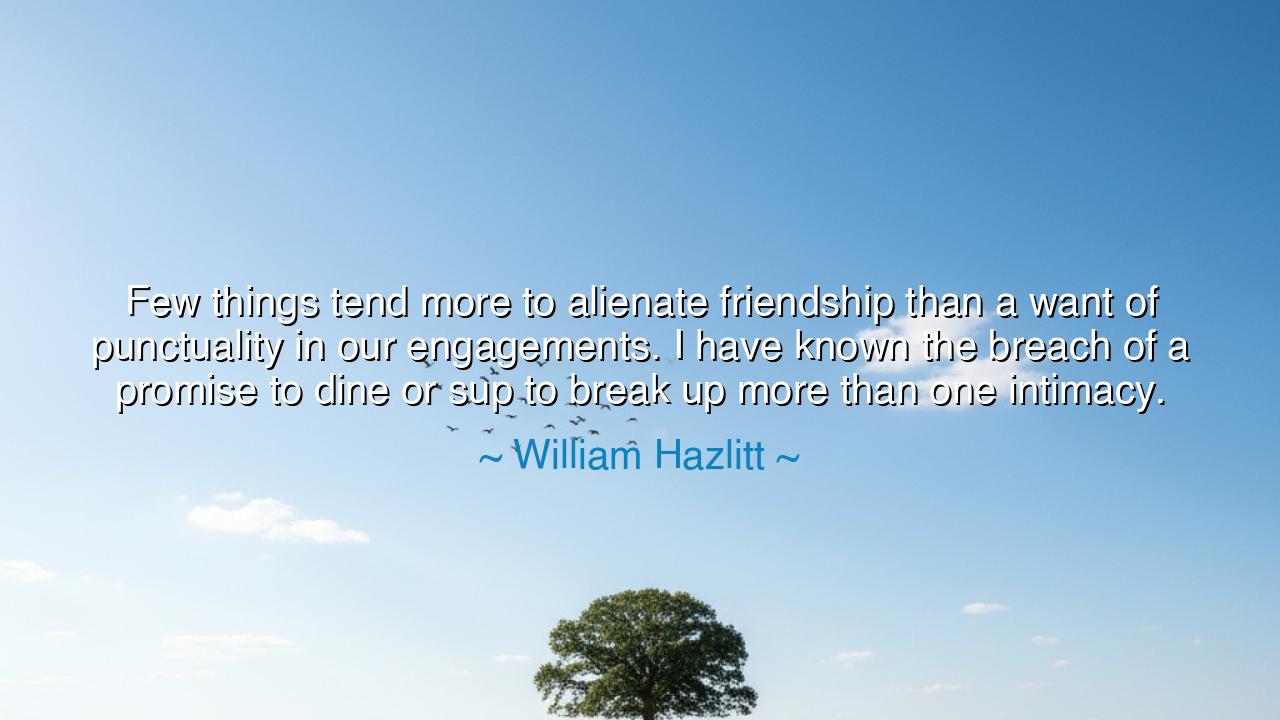
Few things tend more to alienate friendship than a want of
Few things tend more to alienate friendship than a want of punctuality in our engagements. I have known the breach of a promise to dine or sup to break up more than one intimacy.






Hearken, O seekers of wisdom, to the words of William Hazlitt, whose keen observation pierces the subtleties of human relations: “Few things tend more to alienate friendship than a want of punctuality in our engagements. I have known the breach of a promise to dine or sup to break up more than one intimacy.” In these words lies a timeless truth: that friendship, delicate and precious, is nourished not only by grand gestures of affection, but also by the faithful observance of small commitments, the honoring of time, and the respect shown through consistency and reliability.
The origin of this insight rests upon Hazlitt’s acute awareness of human character and social custom. In the theater of life, friendships are tested not only by trials of loyalty or adversity but also by the everyday acts that demonstrate respect. To break a promise, to neglect an engagement, even in trivial matters, is to erode trust subtly yet steadily. The ancients knew this well: Cicero wrote of the importance of fidelity in all dealings, recognizing that friendship is maintained through honor, attention, and faithful observance of shared expectations.
Consider the tale of Alexander Hamilton and John Laurens, whose bonds of friendship during the American Revolution were strengthened through consistent attention and mutual regard. Letters, meetings, and shared plans were meticulously honored, creating a foundation of trust that could withstand political pressures, peril, and distance. Had they neglected these small but sacred engagements, their alliance and companionship might have fractured, illustrating Hazlitt’s point: punctuality and reliability in commitments are essential to sustaining intimacy.
The essence of this teaching is that friendship is built upon countless small acts of respect, each serving as a brick in the edifice of trust. While dramatic displays of loyalty or courage may inspire admiration, it is the steady honoring of promises, the mindful keeping of engagements, and the attention to shared plans that maintains the vitality of companionship. Neglect these, and the bond—however strong—may weaken imperceptibly, leading to alienation and the quiet dissolution of intimacy.
Even in modern times, one sees the truth of Hazlitt’s observation. Consider the friendship between Marie Curie and her closest scientific collaborators. Their enduring bonds were maintained through the faithful execution of shared experiments, the punctual exchange of ideas, and the honoring of commitments both public and private. These acts, though small, fostered a climate of trust and mutual respect, allowing both collaboration and friendship to thrive, even under the pressures of pioneering work.
Hazlitt’s words also remind us that social bonds are fragile and require vigilance. Friendship is not an abstraction; it lives in the rhythm of human interaction, in the attention to the expectations and dignity of others. The failure to honor an engagement, whether a dinner, a meeting, or a simple promise, is a signal of disregard, however unintended, and can quietly sow seeds of resentment and distance. Recognizing the moral weight of such acts strengthens both character and relationships.
Practical guidance flows naturally from this wisdom: honor your commitments with conscientiousness, respect the time and expectations of those you cherish, and treat punctuality as an expression of loyalty and care. Communicate clearly when unavoidable delays arise, and cultivate the habit of reliability in all interactions. Through these deliberate actions, the edifice of friendship is maintained, its bonds fortified against the erosions of neglect or inadvertent disregard.
Thus, remember the teaching of William Hazlitt: the small courtesies of punctuality and fidelity in engagement are not trivial—they are the foundation upon which enduring friendship rests. Nurture them with diligence, and your bonds will endure the passage of time, sustaining intimacy, trust, and mutual regard. In this practice lies the quiet heroism of human connection, the unseen labor that transforms ordinary companionship into lasting friendship.
If you wish, I can also craft a short, rhythmic version suitable for motivational or audio narration, highlighting the emotional and moral weight of punctuality in sustaining friendship. Do you want me to do that?






AAdministratorAdministrator
Welcome, honored guests. Please leave a comment, we will respond soon